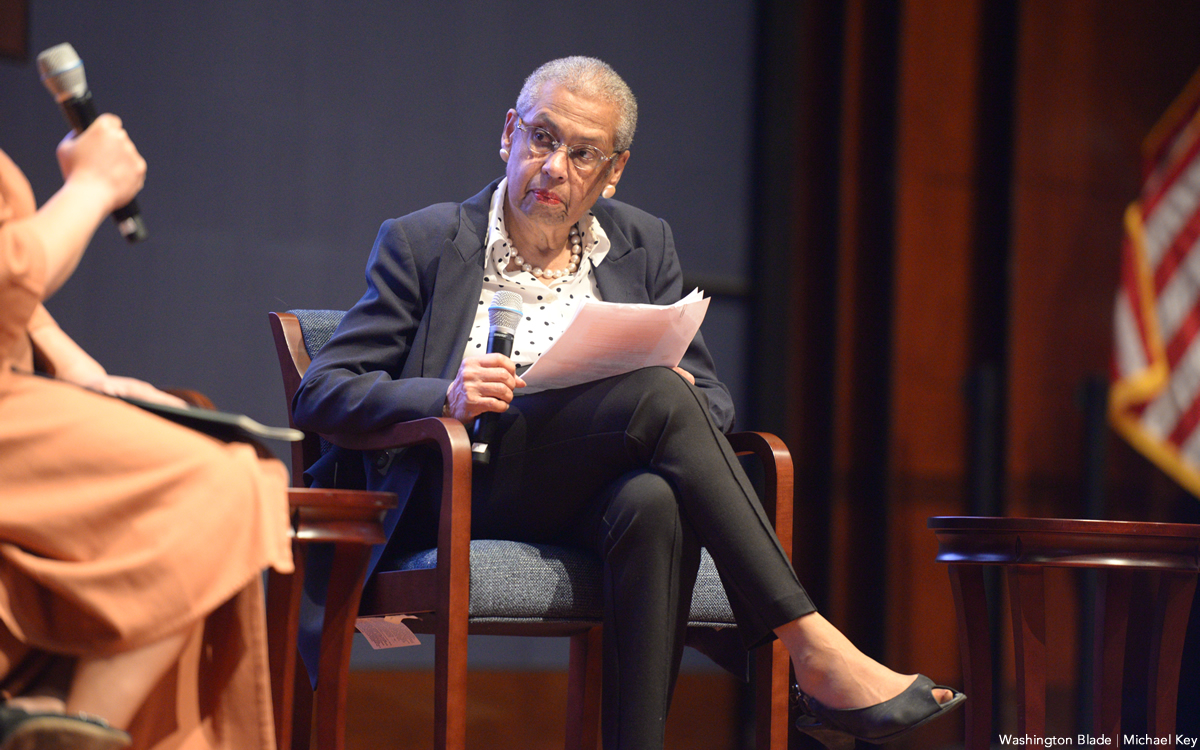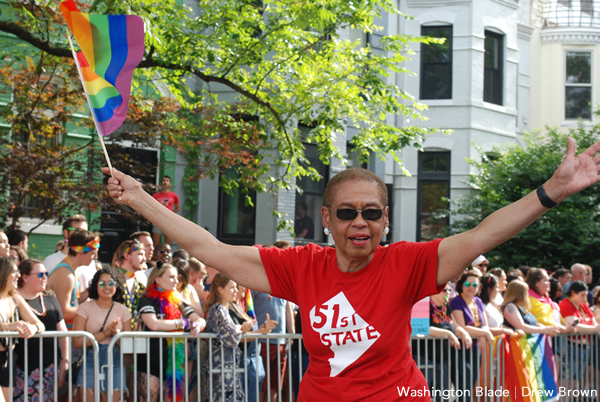News
Jeb Bush blames Obama for Republican vitriol against LGBT rights
‘The Republican Party responded by trying to out-polarize the president’


Former Gov. Jeb Bush (R-Fla.) blames Obama for the Republican Party’s ant-LGBT vitriol. (Washington Blade file photo by Lee Whitman)
Former Florida Gov. Jeb Bush may have had an abysmal showing in the Republican presidential primary, but that isn’t stopping him from blaming President Obama for GOP vitriol against LGBT rights.
In an op-ed published Friday in the Washington Post, Bush explains his lack of support for Donald Trump, who’s set to accept the Republican presidential nomination this week in Cleveland, saying he isn’t the future the Republican Party.
But Bush blames Obama’s policy decisions and efforts to act as his own when Congress won’t as the reason why Trump rose to prominence.
“Eight years of the divisive tactics of President Obama and his allies have undermined Americans’ faith in politics and government to accomplish anything constructive,” Bush writes. “The president has wielded his power — while often exceeding his authority — to punish his opponents, legislate from the White House and turn agency rulemaking into a weapon for liberal dogma.”
Among Obama’s executive actions are signing an executive order barring federal contractors from engaging in anti-LGBT workplace discrimination. The Obama administration undertaken has numerous actions on behalf of LGBT rights that a President Trump could undo under his administration.
It’s these executive actions Bush says are to blame for the Republican Party attempting to “out-polarize the president” with vitriol against LGBT people as well as other minority groups.
“In turn, a few in the Republican Party responded by trying to out-polarize the president, making us seem anti-immigrant, anti-women, anti-science, anti-gay, anti-worker and anti-common-sense,” Bush writes.
The same week Bush published his op-ed, the Republican Party drafted a national platform that critics have called the most anti-LGBT ever. Among other things, it seeks to overturn the U.S. Supreme Court’s decision in favor of same-sex marriage, supports barring transgender people from bathroom use consistent with their gender identity and endorses widely discredited “ex-gay” conversion therapy.
For his part, Bush said during his failed presidential campaign support for traditional marriage — code for opposition to gay nuptials — should be “a core American value” to protect children born in poverty.
“It’s talking about being formed by one’s faith, it’s at the core of the Catholic faith and to imagine how we are going to succeed in our country unless we have committed family life, committed child-centered family system is hard to imagine,” Bush continued. “So, irrespective of the Supreme Court ruling because they are going to decide whatever they decide, I don’t know what they are going to do, we need to be stalwart supporters of traditional marriage.”
Russia
Russia designates ILGA World an ‘undesirable’ group
Justice Ministry announced designation on Jan. 21

Russia has designated a global LGBTQ and intersex rights group as an “undesirable” organization.
ILGA World in a press release notes the country’s Justice Ministry announced the designation on its website on Jan. 21.
The ministry’s website on Tuesday appeared to be down when the Washington Blade tried to access it. ILGA World in its press release said the designation — “which also reportedly includes eight other organizations from the United States and across Europe” — “has been confirmed by independent sources.”
“ILGA World received no direct communication of the designation, whose official reasons are not known,” said ILGA World.
The Kremlin over the last decade has faced global criticism over its crackdown on LGBTQ rights.
ILGA World notes Russians found guilty of engaging with “undesirable” groups could face up to six years in prison. The Russian Supreme Court in 2023 ruled the “international LGBT movement” is an extremist organization and banned it.
“Designating human rights groups ‘undesirable’ is outlandish and cynical, yet here we are,” said ILGA World Executive Director Julia Ehrt. “But no matter how much governments will try to legislate LGBTI people out of existence, movements will stay strong and committed, and solidarity remains alive across borders. And together, we will continue building a more just world for everyone.”
Honduras
Corte IDH reconoce a Thalía Rodríguez como familia social de Leonela Zelaya
Se construyeron una familia tras más de una década de convivencia

Por DORIS GONZÁLEZ * | TEGUCIGALPA, Honduras — En la sentencia del caso Leonela Zelaya y otra vs Honduras emitida por la Corte Interamericana de Derechos Humanos se estableció un hito jurisprudencial para las personas LGBTQ en Honduras, así como en la región en relación a las diversas conformaciones de familias existentes. La Corte IDH interpretó por primera vez el concepto de familia social, indicando que la construcción de familia no debe restringirse a la familia nuclear o a nociones tradicionales, bajo el entendido de que hay diferentes formas en las que se materializan los vínculos familiares.
Este análisis se trae a colación debido al contexto de discriminación, prejuicio y violencia que atravesamos las personas LGBTQ, el cual se puede manifestar incluso dentro de nuestras propias familias. Esta violencia se manifiesta a través de actos de odio como ser el desarraigo familiar, violencia física, psicológica, social, económica, expulsiones de los hogares, violaciones correctivas e incluso, culminando en muertes violentas. Esta violencia motivada por la orientación sexual, identidad y expresión de género de las personas imposibilita la convivencia familiar.
Ante esto, las personas LGBTQ construimos vínculos sociales fuera del vínculo familiar tradicional, los cuales a través de la convivencia, amistad, apoyo económico-social y construcción de vida en común constituyen familias, tal como ocurrió en este caso.
Tras el abandono de su familia biológica, Leonela Zelaya y Thalía Rodríguez construyeron una familia tras más de una década de convivencia, en los cuales se apoyaron mutuamente en diversas situaciones, viviendo como mujeres trans, portadoras de VIH, ejerciendo el trabajo sexual y en situación de pobreza, enfrentando constantes episodios de detenciones arbitrarias y violentas por parte de los órganos policiales.
Tras su asesinato, fue Thalía quien recogió el cuerpo de Leonela en la morgue de Tegucigalpa y quien gestionó el féretro a través de la Funeraria del Pueblo. Los servicios fúnebres de Leonela Zelaya fueron realizados en un bar por mujeres trans, trabajadoras sexuales, al cual no asistió ningún miembro de su familia biológica.
El asesinato de Leonela y la falta de esclarecimiento generaron a Thalía un sentimiento de inseguridad, frustración e impotencia. Por estas violaciones de derechos humanos, la Corte reconoció a Thalía Rodríguez, en calidad de familiar de Leonela, como víctima del caso, generando estándares aplicables a todas las personas LGBTQ.
A juicio de la Corte, esta situación lleva a que, en casos de muertes violentas de mujeres trans, las personas que integren las redes de apoyo de la persona fallecida puedan ser declaradas víctimas por la violación de sus derechos a la integridad psíquica o moral, siempre que se acredite la existencia de un vínculo estrecho con la víctima y una afectación a sus derechos, derivada, por ejemplo, de las gestiones realizadas para obtener justicia. Esta sentencia logra reconocer que las personas LGBTQ construimos familias sociales, familias elegidas, e indica que estas deben ser reconocidas y validadas.
* Abogada litigante del caso Leonela Zelaya y otra vs Honduras, Red Lésbica Cattrachas
District of Columbia
Eleanor Holmes Norton ends 2026 reelection campaign
Longtime LGBTQ rights supporter introduced, backed LGBTQ-supportive legislation

The reelection campaign for D.C. Congressional Delegate Eleanor Holmes Norton, who has been an outspoken supporter of LGBTQ rights since first taking office in 1991, filed a termination report on Jan. 25 with the Federal Elections Commission, indicating she will not run for a 19th term in the U.S. House of Representatives.
Norton’s decision not to run again, which was first reported by the online news publication NOTUS, comes at a time when many of her longtime supporters questioned her ability to continue in office at the age of 88.
NOTUS cited local political observers who pointed out that Norton has in the past year or two curtailed public appearances and, according to critics, has not taken sufficient action to oppose efforts by the Trump-Vance administration and Republican members of Congress to curtail D.C.’s limited home rule government.
Those same critics, however, have praised Norton for her 35-year tenure as the city’s non-voting delegate in the House and as a champion for a wide range of issues of interest to D.C. LGBTQ rights advocates have also praised her longstanding support for LGBTQ rights issues both locally and nationally.
D.C. gay Democratic Party activist Cartwright Moore, who has worked on Norton’s congressional staff from the time she first took office in 1991 until his retirement in 2021, points out that Norton’s role as a staunch LGBTQ ally dates back to the 1970s when she served as head of the New York City Commission on Human Rights.
“The congresswoman is a great person,” Moore told the Washington Blade in recounting his 30 years working on her staff, most recently as senior case worker dealing with local constituent issues.
Norton has been among the lead co-sponsors and outspoken supporters of LGBTQ rights legislation introduced in Congress since first taking office, including the currently pending Equality Act, which would ban employment discrimination based on sexual orientation and gender identity.
She has introduced multiple LGBTQ supportive bills, including her most recent bill introduced in June 2025, the District of Columbia Local Juror Non-Discrimination Act, which would ban D.C. residents from being disqualified from jury service in D.C. Superior Court based on their sexual orientation or gender identity.
For many years, Norton has marched in the city’s annual Pride parade.

Her decision not to run for another term in office also comes at a time when, for the first time in many years, several prominent candidates emerged to run against her in the June 2026 D.C. Democratic primary. Among them are D.C. Council members Robert White (D-At-Large) and Brooke Pinto (D-Ward 2).
Others who have announced their candidacy for Norton’s seat include Jacque Patterson, president of the D.C. State Board of Education; Kinney Zalesne, a local Democratic party activist; and Trent Holbrook, who until recently served as Norton’s senior legislative counsel.
“For more than three decades, Congresswoman Norton has been Washington, D.C.’s steadfast warrior on Capitol Hill, a relentless advocate for our city’s right to self-determination, full democracy, and statehood,” said Oye Owolewa, the city’s elected U.S. shadow representative in a statement. “At every pivotal moment, she has stood firm on behalf of D.C. residents, never wavering in her pursuit of justice, equity, and meaningful representation for a city too often denied its rightful voice,” he said.
A spokesperson for Norton’s soon-to-close re-election campaign couldn’t immediately be reached for a comment by Norton on her decision not to seek another term in office.
-

 World5 days ago
World5 days agoCompanies participate in ‘Pride on the Promenade’ at World Economic Forum
-

 Movies5 days ago
Movies5 days agoFew openly queer nominees land Oscar nominations
-

 Minnesota4 days ago
Minnesota4 days agoLawyer representing Renee Good’s family speaks out
-

 District of Columbia4 days ago
District of Columbia4 days agoJudge denies D.C. request to dismiss gay police captain’s anti-bias lawsuit




















